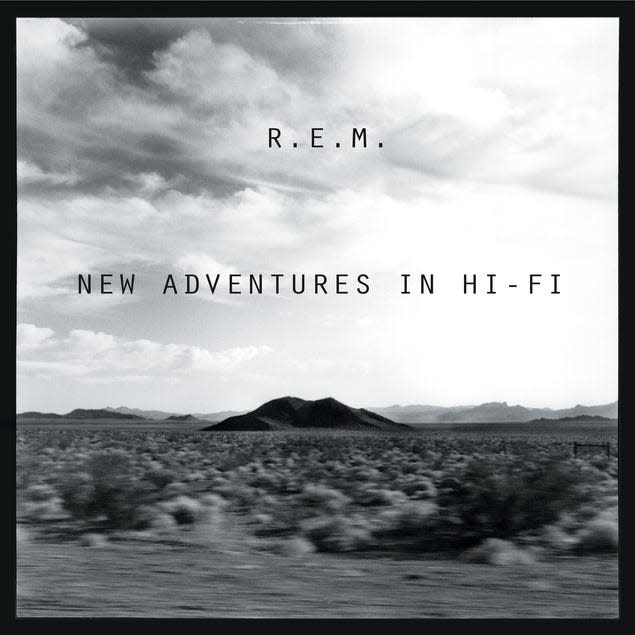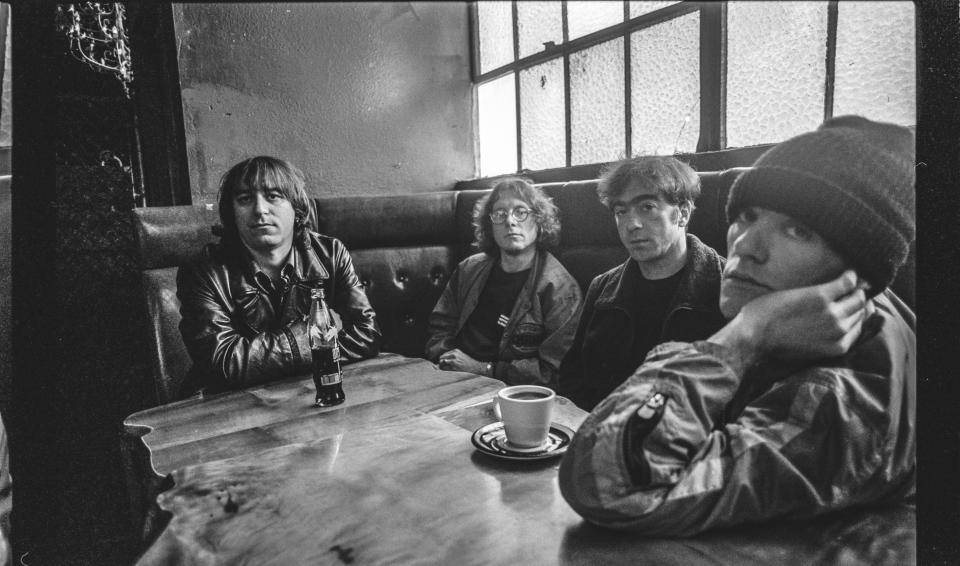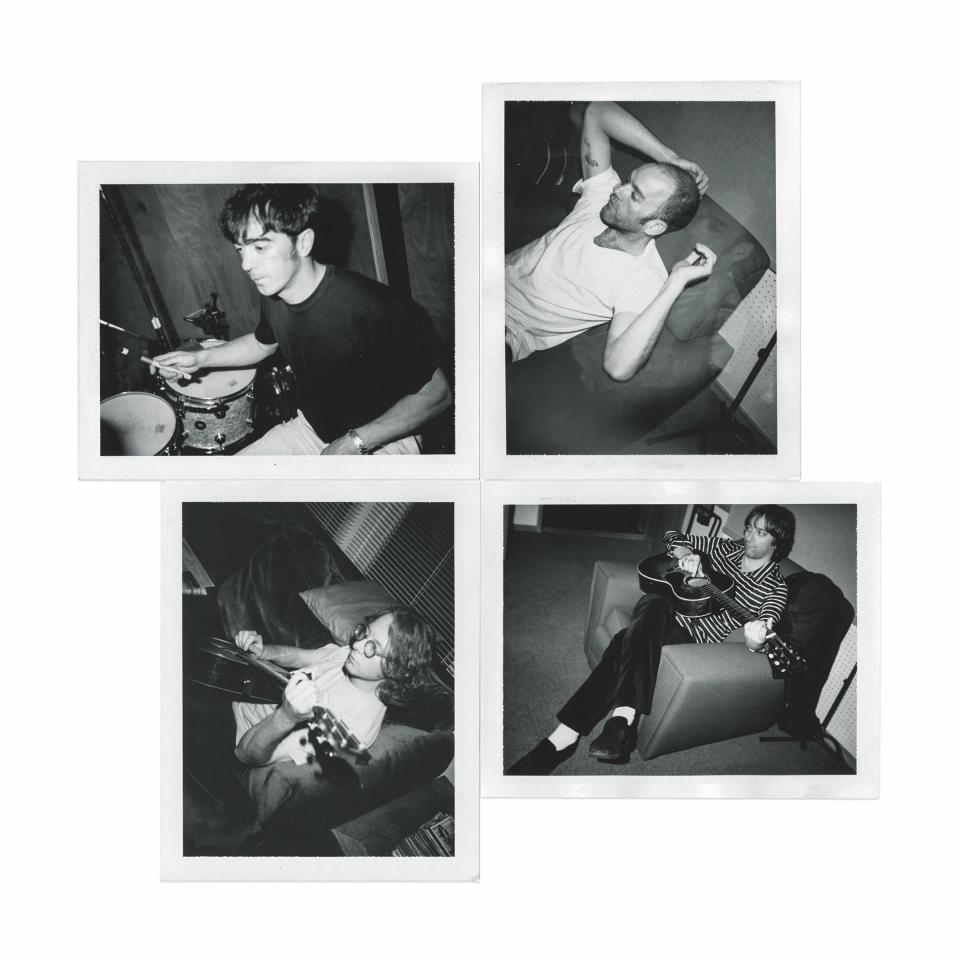R.E.M. marks 25 years of 'New Adventures in Hi-Fi' but has no plans to reunite: 'It’s bittersweet'
To many fans, “New Adventures in Hi-Fi” represents R.E.M. at its creative peak.
The Athens, Georgia-based quartet – singer Michael Stipe, drummer Bill Berry, guitarist Peter Buck and bassist Mike Mills – had already commandeered radio and MTV with hits from “Green,” “Out of Time” and “Automatic for the People” before the 1996 release of their 10th studio album.
Recorded primarily during sound checks on the band’s 1995 megatour to support their “Monster” album, “New Adventures” is notable for not only for its idiosyncratic process, but the health issues that plagued the band during its creation on the road.
Berry collapsed in Switzerland from a brain aneurysm; Mills suffered an intestinal adhesion; and Stipe underwent emergency surgery to repair a hernia. Following the release of the album, Berry departed the band.
The R.E.M. Steeple: Celebrating the band in Athens, Georgia

Although the album didn’t capture the same Billboard singles chart success as “Losing My Religion” and "Shiny Happy People,” the tracks “E-Bow the Letter” and “Bittersweet Me” garnered reasonable airplay on alternative rock radio. The album remains a critical stalwart as well.
On Friday, a 25th anniversary deluxe reissue arrives, stocked with B-sides, rarities, unreleased video footage and photos and interviews with the original quartet.
To commemorate the rerelease, Mills and Stipe chatted with USA TODAY in separate interviews from their respective homes in Athens.
Q: You wrote most of this album on the road during the “Monster” tour and had a mobile recording truck. What do you remember about recording during those sound check sessions?
Mike Mills: We figured instead of wasting time with sound checks, we could use that time to create something and maybe write a record about being on the road without writing songs about being on the road. Songs about being on the road are kind of not exciting, no one wants to hear about what a slog it is and that you’re lonely in different hotels. So the idea was the traveling and the different crowds would infuse the music with something.
Michael Stipe: There was a misunderstanding at the time that this was a live album. It just has the energy of a live performance, but the vocals were done in a proper recording studio.
Q: What was the biggest challenge about writing on the road without the songs being about that?
Stipe: We all agree that those are the most horrific, navel-gazing types of songs. We knew going into this that it was not something we wanted. The writing and arranging on the road, I was focused completely on that. The energy that comes to the music, a lot of it came from the on-the-fly recording.

Q: Michael, you shot the album’s cover photo in Nevada. Do you have any recollection of what you were looking for at the time?
Stipe: I did a lot of driving in those days, particularly in the American West. I would hold the camera up and shoot out the window. I was probably driving from L.A. to Georgia at the time. The first thing I did when I got money was I bought the safest car I could find in L.A. and would find someone to drive with me. I did it with River Phoenix once to go to a wedding in Georgia. Those road trips were an important part of my songwriting.
Q: This was the last album to feature Bill Berry. Did you have any inkling at the time?
Mills: No, no one knew what Bill’s feeling were. We certainly weren’t thinking about that. We were a band doing our thing.
Stipe: I can guarantee you that Bill didn’t know it at the time.

Q: A lot of fans consider this album peak R.E.M. How do you feel about it when reflecting on the band’s catalog?
Mills: It’s a standalone for us. It’s not like any other record or part of any other series of records we did, other than it being done on the Monster tour. It’s very much its own animal. It is a singular record. I don’t know of anyone else who has made a record on the road like that.
Rock Hall inductions: The Go-Go's talk girl power, legacy
Q: Peter Buck has said “New Test Leper” is his favorite R.E.M. song of the band’s whole catalog. What still resonates with you from the album?
Mills: I don’t listen to R.E.M. records for pleasure, but “How the West Was Won and Where it Got Us” is so eerie and spooky. It was an incredibly organically created song. Bill started playing the drum line, the piano just fell out of me, and in about three minutes we had a framework of the song. It’s rare and exciting and when something happens that fast – it’s usually pretty good. There’s a reason it came out like that. That song was meant to be.
Stipe: I would agree with “New Test Leper.” It’s a song that I worked very, very hard on. I wrote seven completely different drafts and narrative arcs and through all seven I landed on one after watching a daytime TV talk show and someone we would have referred to then as a transvestite was presenting their idea about why they felt compelled to express themselves. That song followed me. I just couldn’t land it. I can remember the couch I sat on when it hit me, and when I wrote that story down on a notebook. That song and “Man on the Moon” (from 1992’s “Automatic for the People”) are two of the most difficult I wrote.
Q: What about “Man on the Moon” made it difficult?
Stipe: The music on it, it was too perfect and complete. There was nothing I could add to it.

Q: Michael was pretty definitive in a recent statement that R.E.M. will never reunite. No regrets about disbanding 10 years ago?
Mills: We enjoy being the one band who said we were going to (disband) and sticking to that; there is something to preserving a legacy. People say they want to see R.E.M. play again and what they really want is to see the band they saw 20 years ago and that band no longer exists.
Stipe: No regrets, but of course it’s bittersweet. We all love each other and will be there for each other. We text on a daily basis. We just don’t create music as R.E.M. anymore. In calling it a day 10 years ago, we did ourselves and our fans a giant favor by preserving a legacy and choosing to walk away when we were at a creative peak. We walked away with our heads held high.
This article originally appeared on USA TODAY: R.E.M. talks 25th anniversary of 'New Adventures in Hi-Fi,' reissue
